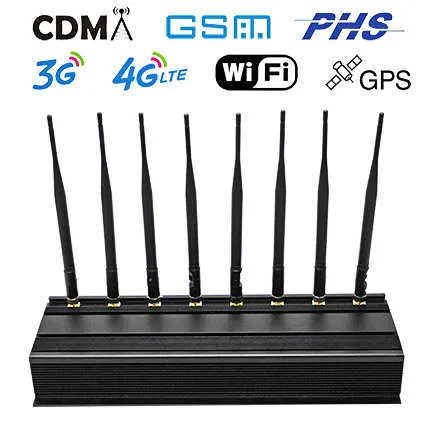The device illegally forces mobile phone silence
F.C.C. spokesman Clyde Enslin declined to comment on the issue or the Maryland case.
Wireless carriers pay tens of billions of dollars to lease spectrum from governments as long as others don't interfere with their signals. And there are additional fees. Verizon Wireless, for example, spends $6.5 billion a year building and maintaining its network.
"It is counterintuitive that this type of device has found a market at a time when wireless consumers' demand for improved cell phone coverage is clear and strong," said Jeffrey Nelson, a Verizon spokesman. These carriers also raise public safety concerns: criminals could use gsm blocker to prevent people from communicating in an emergency.
The CTIA, a major cellphone industry association, asked the F.C.C. on Friday to maintain the illegality of the interference and continue to pursue violators. The company said the move was in response to requests from the two companies to allow jammers to be used in certain situations, such as prisons.
The individuals who used the jammers expressed guilt about their vandalism, but some clearly had a mischievous side, and others gloated over the phones. "It was worth it just to watch those stupid teens in the mall get their phone hung up." Can you hear me? Noooo! Nice, "the jammer's buyer wrote last month in a review on a website called DealExtreme.
Gary, a therapist in Ohio, also declined to give his last name, citing the illegal use of the devices. Interruptions are necessary to get the job done effectively, he says. He runs group therapy sessions for people with eating disorders. During one meeting, a woman's confession was rudely interrupted.
"She was talking about sexual abuse," Gary said. "Someone's phone was turned off and they kept talking."

"There's no etiquette," he said. "It's an epidemic."
Gary said that despite the no-phone policy, calls always interrupt therapy. Four months ago, he bought a jammer for $200 and secretly placed it on the side of the room. He tells patients that if they are waiting for an emergency call, they should give the phone number of the front desk. He didn't tell them about the jammer.
Gary bought the jammer from a website in London called PhoneJammer.com. Victor McCormack, the site's operator, said he ships about 400 jammers a month to the United States, up from 300 a year ago. He says more than 2,000 holiday gifts have been ordered.
Kumaar Thakkar, who lives in Mumbai, India, and sells jammers online, said he exports 20 jammers a month to the United States, twice as many as a year ago. Clients include cafe and hair salon owners and Dan, a New York school bus driver, he said.
"The kids thought they were secretly hiding in their seats and using their phones," Dan wrote in an email to Mr. Tarka, thanking him for selling jammers. "Now kids don't understand why their phones don't work, but can't ask either because they'll get in trouble!" It's fun to watch them try to get the signal."
Andrew, an architect in the San Francisco area, said using jammers started out as fun and became a practical way to keep quiet on the train. Now he uses it more wisely.
"At this point, just knowing that I have the power to cut someone off is satisfying enough," he said.

One afternoon in early September, an architect boarded a local train and became a mobile vigilante. He sat next to a woman in her 20s who he said was "chatting" on her phone.
"She kept using the word 'like.' She sounded like a valley girl," said architect Andrew, who declined to give his last name because what he did next was illegal.
Andrew reached into his shirt pocket and pressed a button on a black device the size of a cigarette pack. It emits a powerful radio signal that interferes with the chatterer's cellphone transmissions as well as those of others within a 30-foot radius.
"She spoke into the phone for about 30 seconds before she realized no one was listening on the other end of the phone," he said. What was his reaction when he first discovered he could wield such power? "Oh my gosh! Liberation."
As cellphone use soars, making it difficult not to hear half of a conversation in many public spaces, a small but growing group of rebels are turning to a blunt countermeasure: cellphone jammers, devices that interfere with nearby mobile devices invalid.
The technology is not new, but foreign exporters of jammers say demand is increasing and they are sending hundreds of jammers to the United States each month, prompting scrutiny from federal regulators and the wireless industry last week. new worries. Buyers include cafe and hair salon owners, hoteliers, speakers, theater operators, bus drivers and, increasingly, public transport commuters.
The development is sparking a battle for control of the airspace over the ears. This damage is collateral damage. Insensitive talkers inflict mischief on the defenseless, while jammer device punish not only the perpetrators but also the more cautious chatterboxes.
"If there's one thing that defines the 21st century, it's our inability to back down for the benefit of others," said James Katz, director of the Mobile Communications Research Center at Rutgers University. "The caller thought he was rights outweigh those of those around them, and the disruptor believes his rights are more important.”
Jamming technology emits radio signals so strong that they overload cell phones and prevent them from communicating with cell towers. Ranges range from a few feet to several meters, and equipment costs between $50 and a few hundred dollars. Larger models can be reserved to create no-call zones.
It is illegal to use gps blocker in the United States. Radio frequencies used by mobile phone providers are protected in the same way as those used by television and radio stations.
The Federal Communications Commission says first-time users of cell phone jammers could be fined up to $11,000. His law enforcement agencies have prosecuted several U.S. companies for distributing the devices and are also prosecuting their users.
F.C.C. investigators said Verizon Wireless visited an upscale restaurant in Maryland last year. The store owner, who asked not to be named, said he spent $1,000 on a high-powered jammer because he was tired of employees focusing on their phones instead of customers.
"I tell them, put your phone away, put your phone away, put your phone away," he said. They ignored him.
The store owner said F.C.C. investigators spent a week there, using special equipment designed to detect jammers. But the owner has turned it off.
Verizon investigators were also unsuccessful. "He went to everyone in town and gave them his phone number and said if they had any questions to call him immediately," the store owner said. He said he had stopped using the wifi blocker.
Of course, detecting the use of smaller, battery-powered jammers, such as those used by disgruntled commuters, would be more difficult.

Comments
Post a Comment